Engaging Communities for Primary Prevention of Type II Diabetes Mellitus in Imo State and FCT
According to the International Diabetes Federation, over 19 million people in Africa were estimated to have Diabetes in 2019 [1]. Nigeria has the second largest number of adults (20 -79 years) living with diabetes in Africa amounting to a 59% increase in number of people with the disease in Nigeria between 2016 (1.7 million) and 2019 (2.7 million) [1]. The IDF estimated that one in 33 adults aged 20-79 years in Nigeria had diabetes with 48% of them presently undiagnosed.
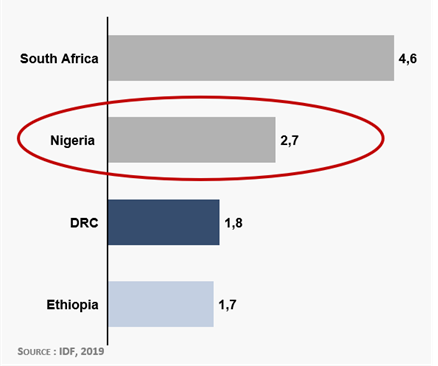
Figure 1: Highest contributors of diabetes in Africa in 2019 (millions)
The inherent danger with undiagnosed cases is that diabetes has several irreversible complications which could lead to end organ damage, heart attack, and death. These complications usually have direct and indirect consequences on the person, community and health system in general [2]. In addition, several community-based studies conducted in different parts of Nigeria show inadequate awareness, poor attitude, and practice for diabetes [3- 6]. Studies in Imo and Edo States showed 40% [5] and 60% [6] ignorance about the cause, risk factors and care for diabetes respectively. In Nigeria, the first entry point for diabetes care should be the primary health care centres with accessible preventive care provided within communities by Community Health Extension Workers (CHEWs) [7] however, the service provided at these levels is sub-optimal. This further contributes to the lack/paucity of awareness of diabetes risk factors in communities in Nigeria and leads to missed opportunities for primary prevention of Diabetes within the primary health centres and communities.
Community sensitization and screening are part of the activities in the ongoing Diabetes Awareness and Care (DAC) project implemented in Imo State and the Federal Capital Territory, Nigeria. The DAC project is a collaboration between the Federal Ministry of Health (FMoH) and Health Strategy and Delivery Foundation (HSDF), which seeks to improve awareness, access to care, and utilization of T2DM data in Imo and FCT by June 2021. To achieve these goals, using a set of criteria*, we selected twelve communities in Imo and four in the FCT to work in. In these states, HSDF partners with the State Ministries of Health and Community Based Organizations (CBO) – Centre for Family Health Initiative (CFHI) in Imo and Society for Women Development of Nigeria (SWODEN) in the FCT to engage with critical community stakeholders and gate keepers and sensitize them using evidence-based diabetes Information Education and Communication (IEC) materials. These CBOs will also request for access into their communities (markets, bus parks, religious institutions, and schools) to conduct sensitization and screening for diabetes. The activities are conducted using effective health promotion strategies to improve knowledge on diabetes and its risk factors. Subsequently, utilizing emerging insights from community outreaches, the CBOs engage periodically with the community stakeholders. These round table meetings have improved community ownership and provide an avenue for community stakeholders to discuss better healthy lifestyle options for their citizens.
Thus far, we have sensitized and screened 709,238 and 79,174 persons respectively in 16 communities in both states. Going forward, HSDF will continue to partner effectively with community stakeholders and the ministries of health in these states. Our continued engagements with these key stakeholders will contribute greatly towards improving diabetes awareness and access to care in communities in across the two focus states.
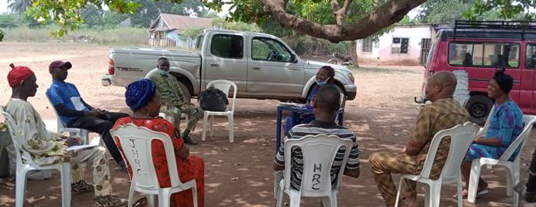
Round table meeting at Ihitte Mbieri, Mbaitoli LGA, Imo state 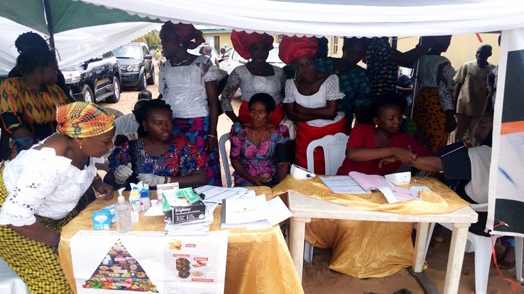
Screening camp at women’s general meeting in Owerri, Owerri Municipal LGA, Imo state 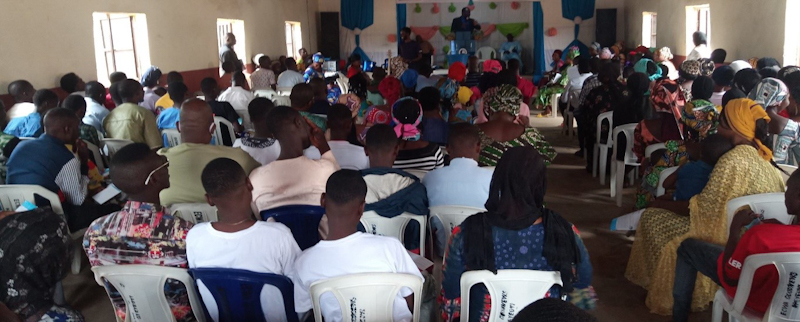
Sensitization at ECWA Church Kpeyegi, Abuja Municipal Area Council (AMAC), FCT 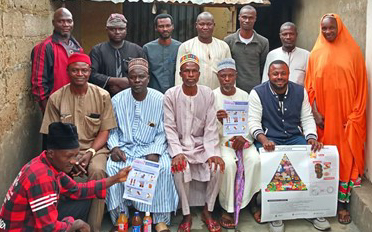
Advocacy meeting at Dei-Dei community, AMAC, FCT
References
- IDF ATLAS 9th Edition. Available online at https://www.diabetesatlas.org/en/resources/
- WHO, 2021. Diabetes. Available online at https://www.who.int/news-room/fact-sheets/detail/diabetes
- Otovwe, A., Oyewole, O.E., Igumbor, E.O. and Nwose, E.U., 2018. Diabetes care in delta state of Nigeria: An expository review. Diabetes Updates, 4(3), pp.1-8.
- Muhammad, F. and Enikuomehin, A., 2019, November. Diabetes-related knowledge, attitude and practice among patients attending a Tertiary Hospital in Kano, Northwestern Nigeria. In Society for Endocrinology BES 2019 (Vol. 65). BioScientifica.
- Achigbu et al., 2015. Knowledge and impact of diabetes in patients in a tertiary clinic in Southeast Nigeria: African Journal of Diabetes Medicine.
- Odili et al., 2011. Patients’ Knowledge of Diabetes Mellitus in a Nigerian City: Tropical Journal of Pharmaceutical Research 10 (5): 637-642
- Federal Government of Nigeria, 2018 . Second National Strategic Health Development Plan 2018 – 2022 Available online at https://www.health.gov.ng/doc/NSHDP%20II%20Final.pdf
*Community selection criteria
- One urban and one rural community in selected LGAs
- Community population and density
- Security
Grants and Business Development Specialist
We are seeking a highly motivated and experienced Grants and Business Development Specialist to join our organization. The successful candidate will be responsible for identifying funding opportunities, developing grant proposals, and fostering partnerships with potential donors and stakeholders (regional and global). This role plays a vital part in securing funds and resources to support our organization’s mission and projects.
Apply NowPublic Health Consultant, Guinea
The consultant (working with the Accelerator team) will collect results from the tool, organize a meeting with stakeholders to discuss results from the tool, and produce a report on key findings and recommendations from the tool to be shared publicly.
Apply NowPublic Health Associate, Senegal
We are currently in search of an experienced Public Health professional in Senegal to work on the anticipated Nutrition Capacity Development and Financing Platform and provide technical assistance to elevate nutrition financing and strengthen local capacity to support these efforts. The Associate must be bilingual (English and French).
Apply Now